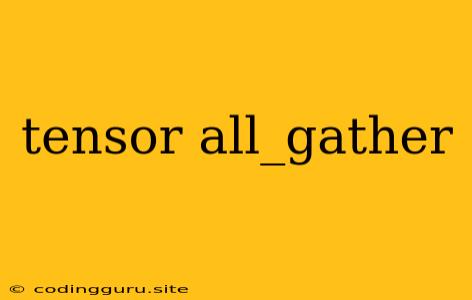Understanding and Utilizing all_gather in Tensor Operations
In the realm of parallel and distributed computing, efficient data aggregation is crucial for achieving optimal performance. The all_gather operation in Tensor frameworks like PyTorch, TensorFlow, and others provides a powerful mechanism for gathering data from multiple processes or nodes, enabling collaborative computation across distributed systems. This article explores the concept of all_gather in the context of tensor operations, highlighting its importance, functionality, and practical applications.
What is all_gather?
Imagine a scenario where you have multiple computing units, each holding a portion of a larger dataset. To perform computations on the entire dataset, you need to gather all the individual pieces into a single entity. This is where all_gather comes into play.
The all_gather operation facilitates the collection of data from every process in a distributed system, combining it into a single tensor on each process. It's like a synchronized data exchange, ensuring all nodes receive a complete copy of the consolidated dataset.
How does all_gather work?
The underlying mechanism of all_gather involves a communication protocol designed to efficiently exchange data across multiple nodes. This process typically leverages collective communication libraries like MPI (Message Passing Interface) or NCCL (NVIDIA Collective Communication Library).
The key steps involved in a all_gather operation are:
-
Data Partition: Each process holds a portion of the data, typically represented as a tensor.
-
Communication Exchange: Processes communicate with each other, sending their data segments to designated destinations.
-
Data Aggregation: Each process receives data from all other processes, accumulating the complete dataset in a single tensor.
When to use all_gather?
all_gather is particularly useful in scenarios where distributed processing requires the aggregation of data from multiple nodes, such as:
-
Model Training: In distributed deep learning,
all_gatherplays a crucial role in collecting gradients computed on different data partitions, enabling efficient model updates across multiple GPUs or nodes. -
Data Reduction: Performing operations like summation, averaging, or other data reduction techniques on distributed datasets often requires
all_gatherfor accumulating values across different nodes. -
Parallel Algorithms: Several algorithms in numerical computing rely on efficient data aggregation. For instance, distributed matrix multiplication or graph algorithms can leverage
all_gatherfor collecting partial results from different processes.
Examples of using all_gather in different frameworks:
PyTorch
import torch
import torch.distributed as dist
# Define a tensor on each process
tensor = torch.ones(10)
# Perform all_gather
dist.all_gather(tensor, tensor, async_op=True)
# Now each process holds a tensor with all data from every process
TensorFlow
import tensorflow as tf
# Define a tensor on each process
tensor = tf.ones(10)
# Perform all_gather
gathered_tensor = tf.distribute.experimental.gather(tensor, tf.distribute.get_strategy())
# Now each process holds a tensor with all data from every process
Tips for Efficient all_gather Usage:
-
Data Alignment: Ensure that the data partitions held by each process are aligned to maximize communication efficiency.
-
Optimized Communication: Utilize high-performance communication libraries like MPI or NCCL for optimal data exchange.
-
Communication Overhead: Be mindful of the communication overhead associated with
all_gather. Optimize the data partitioning and communication patterns to minimize this overhead.
Conclusion
all_gather is a powerful tool for aggregating data across distributed computing systems. By efficiently collecting data from multiple nodes, all_gather enables efficient parallel and distributed computations, enhancing the performance of various applications. Understanding and leveraging the capabilities of all_gather is essential for developers working with distributed computing frameworks.
